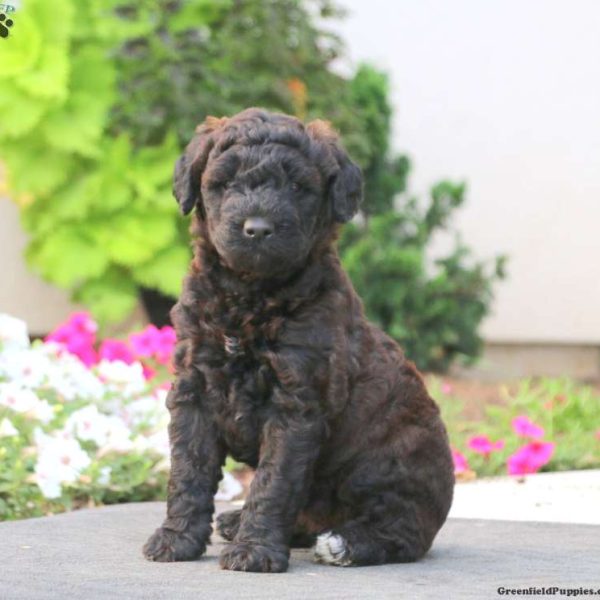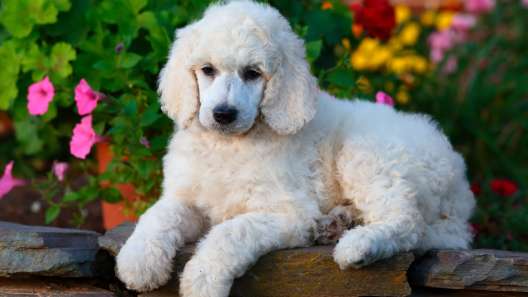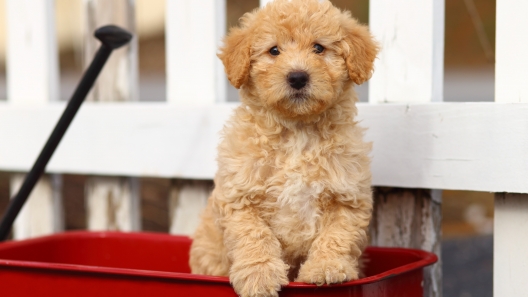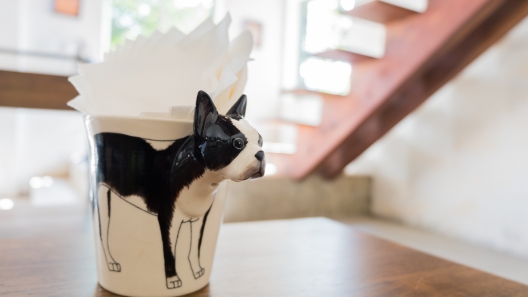
-
Activity Level:
high
-
Shedding Level:
low
-
Grooming Level:
high
-
Trainability:
high
-
Good for Novice Owners:
high
-
Adaptability:
high
-
Kid/Pet Friendly:
often
-
Prey Drive:
high
-
Watchdog:
aware
- Average Size: Medium
- Average Lifespan: 12-15 years
- Registered?: other
Standard Whoodle Dog Breed Information
Overview
Temperament
Adaptability
Health
Owner Experience
Grooming
Activity Level
Size
Life Span
Did You Know?
Whoodles are a lovable, fluffy cross between a Standard Poodle and a Soft-Coated Wheaten Terrier, a Standard Whoodle with either of the original parent breeds, or two Standard Whoodles. The main goal was to develop a dog that combined the coat of the Wheaten Terrier with the workability of the Poodle.
Individual dogs will vary. In general, Whoodles tend to be affectionate, playful dogs that make great family companions as well as intelligent and determined working dogs. Although this dog breed is not recognized by the American Kennel Club, they are recognized by other dog registries. The Whoodle is recognized by the ACHC (American Canine Hybrid Club).
Standard Whoodles tend to be affectionate, energetic, intelligent, and playful. They bond closely with their families and love being around them. Well-socialized, they tend to get along well with children and other dogs in the family.
They can be initially wary of strange dogs and people, but tend to warm up quickly once introduced provided they are properly socialized. They also tend to have a high prey drive. They usually do well with animals they have been raised and socialized with, but retain an urge to chase animals outside of the family.
Whoodles aren’t known to bark a lot outside of alerting unless they have been accidentally trained into it. Working with your dog to socialize them and train your dog to stop barking early on can keep this behavior from getting out of hand.
Although they are high-energy dogs, Whoodles are highly adaptable dogs. Whoodle puppies will flourish in a home with a fenced yard where they can run. Provided they get enough daily exercise and attention, they adapt well to apartments as well.
They do well in most climates. As with any dog, they are sensitive to heat. Their coat provides a little extra insulation in the cold, but they may still need some winter dog products to stay warm while out on colder winter walks.
Although these dogs can become a little more independent as they age, they still do not like to be left alone for long periods of time. They prefer to be close to their families and spend time with them. They also have a lot of energy and get bored easily, so you don’t want to leave them to their own devices for too long.
Potential health concerns to be aware of in Whoodles can include glaucoma, skin conditions, luxating patella, hypothyroidism, Von Willebrand’s disease, Cushing’s disease, hip dysplasia, and epilepsy. Good breeding practices and the health of the parents make a big difference in the health of Standard Whoodle puppies.
Reputable breeders will screen their dogs before breeding to ensure they are not passing preventable issues to puppies. Make sure you talk to the breeder about the health and genetic history of the parents. You can also ask about any health tests or clearances that have been done.
Like their parents, Standard Whoodles are barrel-chested dogs, which means they are at a higher risk for bloat. Bloat in dogs can be dangerous and quickly becomes fatal if the stomach flips (i.e. gastric torsion occurs). It’s important to know how to reduce the risk of bloat and what symptoms mean you need to get to the emergency vet.
Standard Whoodles are intelligent dogs that are eager to please. They tend to be easy to train for many first-time pet owners. They are eager to understand their owner and will gradually learn basic commands within the first year.
If you are not confident in your training skills, then you should consider hiring a professional trainer for a few sessions or attending puppy training classes. Not only will these classes help with training, but they will also help socialize your dog and help you build a bond with your dog.
The Whoodle inherits a low-shedding coat from both of their parents, so you won’t have to worry about loose fur all over the place. However, low shedding is not low maintenance. Their coat is prone to tangles and mats, which means daily brushing. Professional grooming is recommended every 6-8 weeks.
In addition to coat care, you will also need to take care of your Standard Whoodle’s nails, ears, and teeth. Once or twice monthly nail trimming is usually sufficient. Weekly ear checks, along with careful cleanings as needed, can help prevent ear infections.
Brushing their teeth every day, along with cleanings at the vet as needed, is good dental care for dogs, which is essential to preventing painful dental diseases like gum disease and tooth decay later in life.
Standard Whoodles have a lot of energy and require a lot of daily exercise to be happy and healthy. Daily walks plus some playtime and time to run are usually enough for these dogs. They love spending time with you though, so they will likely be up for more if it means they get to be nearby.
If they enjoy the water, swimming is a great low-impact activity for Whoodle puppies. When puppies finish growing and the vet has cleared them for higher-impact activities, they’ll likely be excited for more vigorous activities like hiking, training for dog sports, running, and more.
A fully-grown Standard Whoodle usually stands 15-22 inches in height and weighs 30- 45 pounds.
A Standard Whoodle generally lives for 12-15 years on average.
Like Poodles, Whoodles also come in three sizes depending on their parents. Standard, or medium, Whoodles are the largest at over 15 inches tall. Mini Whoodles have a Mini Poodle parent and are usually 14-17 inches tall and weigh 20-30 pounds. If the Poodle parent is a Toy Poodle, Toy Whoodles tend to be around 10 inches tall and weigh 9-11 pounds.









